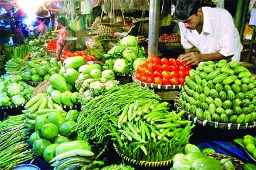 Food inflation, which was at a 17-year high of 19.05 per cent for the week ended November 28, has started falling due to a steep decline in prices of agricultural commodities.
Food inflation, which was at a 17-year high of 19.05 per cent for the week ended November 28, has started falling due to a steep decline in prices of agricultural commodities.
Economists forecast the benchmark food price indicator to slip to 12 per cent in near future.
While briefing about food inflation in a conference, Chairman of the Commission for Agricultural Costs and Prices, Prof S Mahendra Dev, said good rabi crop would help in bringing down prices.
He added that food inflation could drop to about 12 per cent over the near-medium term, and would keep declining further beyond.
CACP is the primary body for recommending minimum support prices for the agriculture produce and is a determinant of food pricing and policy.
The government has taken several measures to calm food prices. This includes weekly release of sugar in open market from the monthly quota and the open market sale of wheat. Changing base effect should also come to rescue.
While prices of pulses, rice, wheat and sugar had already started falling, edible oils and milk products were still some areas of concern, said Dev.
In the last two months, prices of pulses have fallen 28 per cent, while wheat and rice have dropped 12 per cent and 20 per cent, respectively.
Sugar prices have also started falling after hitting the peak of Rs 3,975 a quintal on January 7. Since then, the sweetener has declined 15 per cent in the spot-whole sale market.
India's wheat output is estimated at 82.58 million tonnes in 2009-10, two million tonnes higher than the previous year.
VK Chaturvedi, managing director of Usher Agro Ltd, a rice and wheat processing company, estimates a decline in rice output at 85 million tonnes from 90 million tonnes last year.
Madan Sabnavis, chief economist of the National Commodity & Derivatives Exchange , however, said, "Since prices were at a record high last year, farmers brought additional area under major commodities. Consequently, output increased during the ongoing rabi season.
"This will have an obvious impact on prices and will be reflected in food inflation."
However, he added, "Despite the decline in prices, commodities are not going to return to the last year's level. Tur dal last year was quoted at Rs 45 a kg, which perked up 100 per cent to Rs 90 a kg. If that is falling now to Rs 65 a kg, the price still remains higher by 45 per cent than the last year's price."
But, oilseeds crop may remain an issue. Dorab Mistry, director, London-based Godrej International, told Business Standard, "I believe food inflation in India will come down.
"Prices of wheat, other cereals, pulses and vegetables should drop. However, vegetable oil prices will display a contrary tendency.
"So far, vegetable oil prices have been reasonable and have not contributed to inflation. But, from now onwards, prices of vegetable oil may rise due to higher prices paid for imported vegetable oils."
Oilseed prices so far remained low, as palm oil prices were falling globally. Strengthening rupee also helped in keeping a check on import costs.
Mistry suggested that the government should continue with the public distribution system and keep the subsidy in place to keep local prices under control.






